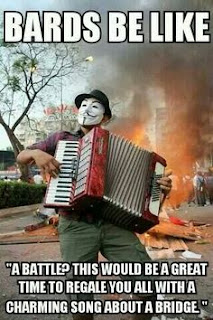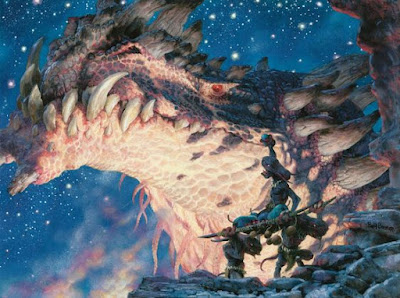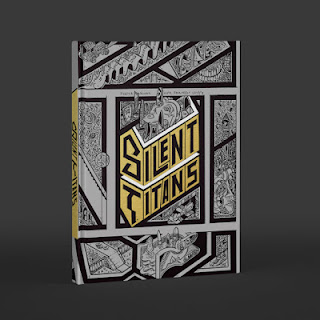Thoughts on Bards, Clerics, and Christianity
A new player is joining the party and speculated on perhaps playing a bard of some kind because he had seen from the blog that this party was pretty combat savvy already and thought it would be cool to be a purely social character with some support elements.
That got me thinking about the Bard classes I have seen from other games like 4e,5e, and Pathfinder but I always had some trouble with these classes. For one, performing in combat is stupid. In the midst of that clash of steel on steel with adrenaline pumping through your veins and blood pounding in your ears, would you even notice someone playing music to give you encourage you? Would you notice the story telling or dance of some half-elf while arcane explosions and dragon fire rages all around you? The logistical problem becomes evident.
However, I like playing the role of the traveling performer and the magical rogue. The bard fits into the world of medieval fantasy. In real history, these were people that played a crucial role in the social machinations of medieval Europe. They preserved Western culture with their oral tradition. They comforted weary travelers around campfires or peasants in Inns. The songs and stories of a people are central to their collective identity. In this way, bards played a similar role as priests. Priests were a core part of the Medieval world. They preached the foundational ideals of the Western world that are essential to our fantasy: Incredible people, braving the chaos of their time, redeeming themselves and their world by bringing light to the darkness. It is no wonder that clerics were made into magical figures when they are such an important aspect of western fantasy.
Why can't the same be true for bards?
They are a part of that heroic tradition in the West. They take the stories of incredible people and make them known to all. They play into the archetypical heroes journey, which is the same redemption narrative that the clerics represent. Let's just throw out the notion of Bards doing non-magical performance during combat. Let's make their music explicitly magical when they are in combat while preserving their normal social role outside of combat.
It is really the reverse problem that designers have with Clerics. Clerics lose their out of combat importance too often. Their blessings are not to be spoken over congregations but as buffs in the heat of battle. They don't speak sermons or attempt evangelism. Part of the problem is the removal of Christianity from an archetype that can never truly be free of its Christian roots. Pagan clerics were just wizards. They spoke spells and curses and had dark gods (patrons) that had to be appeased with rituals.
I recall a recent problem I had with describing a small church in a game. Most of the Lawful religions in games are just pseudo-Catholic and this church was no different. In the back of the church, I had to stop myself from saying that there were implements for Communion because there is no reason for Communion to exist in a world without Christianity and something felt lost. The image of the small chapel was incomplete because I had omitted something foundational to the fantasy world.
I was omitting Christianity.
I am a Christian myself, so I am admittedly biased but I really think that Western Medieval Fantasy is, for better or worse, inexplicably linked to the Christian worldview. This post has gone in a different direction than originally planned so I will have to change the title but I would love to hear your thoughts on the matter. How could you implement Bards into the Dungeon Crawl Classics ruleset? How ought Bards to be implemented in games period? Is D&D intrinsically linked to Christianity? Leave me a comment.
That got me thinking about the Bard classes I have seen from other games like 4e,5e, and Pathfinder but I always had some trouble with these classes. For one, performing in combat is stupid. In the midst of that clash of steel on steel with adrenaline pumping through your veins and blood pounding in your ears, would you even notice someone playing music to give you encourage you? Would you notice the story telling or dance of some half-elf while arcane explosions and dragon fire rages all around you? The logistical problem becomes evident.
However, I like playing the role of the traveling performer and the magical rogue. The bard fits into the world of medieval fantasy. In real history, these were people that played a crucial role in the social machinations of medieval Europe. They preserved Western culture with their oral tradition. They comforted weary travelers around campfires or peasants in Inns. The songs and stories of a people are central to their collective identity. In this way, bards played a similar role as priests. Priests were a core part of the Medieval world. They preached the foundational ideals of the Western world that are essential to our fantasy: Incredible people, braving the chaos of their time, redeeming themselves and their world by bringing light to the darkness. It is no wonder that clerics were made into magical figures when they are such an important aspect of western fantasy.
Why can't the same be true for bards?
They are a part of that heroic tradition in the West. They take the stories of incredible people and make them known to all. They play into the archetypical heroes journey, which is the same redemption narrative that the clerics represent. Let's just throw out the notion of Bards doing non-magical performance during combat. Let's make their music explicitly magical when they are in combat while preserving their normal social role outside of combat.
It is really the reverse problem that designers have with Clerics. Clerics lose their out of combat importance too often. Their blessings are not to be spoken over congregations but as buffs in the heat of battle. They don't speak sermons or attempt evangelism. Part of the problem is the removal of Christianity from an archetype that can never truly be free of its Christian roots. Pagan clerics were just wizards. They spoke spells and curses and had dark gods (patrons) that had to be appeased with rituals.
I recall a recent problem I had with describing a small church in a game. Most of the Lawful religions in games are just pseudo-Catholic and this church was no different. In the back of the church, I had to stop myself from saying that there were implements for Communion because there is no reason for Communion to exist in a world without Christianity and something felt lost. The image of the small chapel was incomplete because I had omitted something foundational to the fantasy world.
I was omitting Christianity.
I am a Christian myself, so I am admittedly biased but I really think that Western Medieval Fantasy is, for better or worse, inexplicably linked to the Christian worldview. This post has gone in a different direction than originally planned so I will have to change the title but I would love to hear your thoughts on the matter. How could you implement Bards into the Dungeon Crawl Classics ruleset? How ought Bards to be implemented in games period? Is D&D intrinsically linked to Christianity? Leave me a comment.



I'm not sure how inexorable the link is between medieval times and Christianity. Plenty of imaginings of medieval Europe downplay the role of religion in society, while plenty of fantastical re-interpretations substitute fictional pantheons for the Catholic Church. Maybe that link shouldn't be ignored, but it's easy to.
ReplyDeleteI do like the idea of the bard having a support/healing role, though, not least because I play the cleric, and I'd sure like a helping hand. :-P Perhaps it would be worth researching the Jester from Darkest Dungeon, who has both support and damage-dealing skills, for ideas?
I do like the Jester from Darkest Dungeon. It fits there thematically. I think the concept of the Assassin-Bard is an interesting one. I don't like the Jester when they pull out their Lute and try to sing over the cacophony of steel, screams, and otherworldly terror because it just doesn't seem realistic that anyone would be paying attention in game unless we outright call what the Bard does magical.
DeleteI have thought before that some kind of systematization of rest would be a cool idea like what they do in Darkest Dungeon and give different classes different downtime abilities. Within such a system the Bard could be the number one out-of-combat support. Then again that feels like it would go against the OSR's strict laxity of rules.
Greetings my friend. It is I the choatic cleric. Laughs evily.
ReplyDeleteGreetings! Did you decide to continue your adventures with Dungeon Crawl Classics?
Deletewe actually neex your guixencd.
DeleteGreetings my friend. It is I the choatic cleric. Laughs evily.
ReplyDeleteGreetings my friend. It is I the choatic cleric. Laughs evily.
ReplyDelete